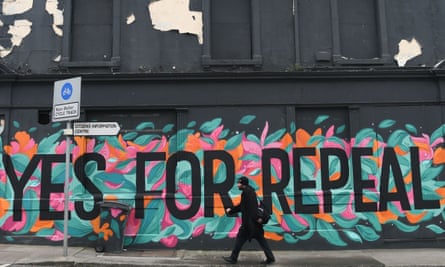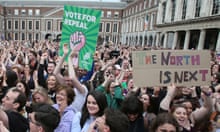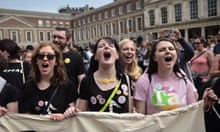‘Apart from the music, tonight is all about awareness,” says a young woman on stage at the Loft, a 200-capacity venue in the heart of Galway city. At charity gig Jamnesty, the room brims with a diverse mass of undergraduates whose informed optimism typifies the spirit that has seen Irish youth become torchbearers for change. Organised by the Amnesty Society of the National University of Ireland, tonight is about raising proceeds for Amnesty International’s It’s Time. Repeal the 8th Campaign, one of many high-profile drives opposing the Eighth Amendment, the divisive constitutional edict that bans abortion.
With more than 154,000 Irish women travelling overseas to obtain an abortion since 1980, the Eighth Amendment – which equates the right to life of a pregnant woman with that of an embryo or foetus, effectively criminalising abortion – goes against international human rights norms. But major changes have paved the way for the 25 May referendum. When the same-sex marriage bill passed in 2015, thanks to an enthused Yes campaign, it revealed how far modern Ireland had come. The result marked a break with a past in which church and state were essentially indivisible, and proved that power lay with the people. The Repeal campaign has channelled the momentum behind a similarly charged issue – and it’s a fight to which Ireland’s musicians have given voice.

High-profile artists including Sinéad O’Connor and Hozier have expressed their support, while others, such as Ed Sheeran, have made more cautious statements. But it’s emergent and unsigned artists who have captured the pro-choice mentality in song. Among them are Dublin feminist garage punk trio Sissy, whose single Sail and Rail tackles the struggles that Irish women face regarding reproductive autonomy. Titled after Stena Line’s Ireland-to-England fare, it’s a fist-clenched, three-minute blitz: “Me and Enya on the sail and rail / Two unwanted pregnancies / But soon we’ll be bikini-ready.”
The trio wrote the song a year after the death of 31-year-old Savita Halappanavar, originally from India, who died at University Hospital Galway in 2012 due to complications arising from a septic miscarriage and failings in her care. “At the time, many people were disgusted at the government, though some blamed the hospital more than the strict laws that govern them,” says bassist and vocalist Michelle Doyle. “There was also a huge amount of airtime being given to lobbying groups – like pro-life group Youth Defence and Catholic pressure group the Iona Institute – on Irish radio and TV. So we took some of their allegations and turned them into lyrics.”
Guitarist Leigh Arthur says: “For example, the ‘bikini-ready’ lyric is taken directly from what was being said in the Irish media. Some believed that vanity was the reason for the momentum, but this surge of support is to do with education and destroying stigma, not because of fashion trends. Some pro-lifers are so out of touch with reality that to use their language in song is to show how farcical it is.”
From Isobel Anderson and Sister Ghost in the north, to Æ MAK, Alien She and Naoise Roo in the Republic, women are at the forefront of Irish music challenging gender inequality and sexual discrimination. Dublin folk-pop four-piece Mongoose echoed the struggles of Irish women with their single Doing Things Wrong. Originally written about a more general sense of confusion and frustration, the band realised that the lyrics (“Conviction fighting to survive”) chimed with the bureaucratic and emotional nightmare of accessing abortion in Ireland. Band member Cara Dunne says the song “came to encompass the struggles of so many women in Ireland. Not speaking out wasn’t an option for us.” The video sees them making a tortuous journey across the Irish countryside, watched over by a stern official in a surgeon’s mask.
Male artists have also rallied behind the cause. Focusing on the experiences of the women who have to travel, often alone, to access abortion clinics abroad, Your Body by Dublin indie rock threesome Shrug Life aims straight for the Irish government’s jugular:
Ill-equipped with unnamed burden
Options blocked for paths unplanned
At age 19, made to understand
Advice goes no further than the law will allow it
And you’re on your own if you need a way around it.
Frontman Danny Carroll says: “Rather than just sloganeering, I wanted to put some narrative and detail around that initial lyric – ‘Your body is not your body / It’s the property of church and state.’ I tried to imagine the tragic absurdity of being on a Ryanair flight home, being surrounded by hen and stag parties, being sold scratchcards by flight attendants and asked about your holiday. After the emotional strain of deciding to undergo that medical procedure, hopping the hurdles of our archaic legal system, it struck me as an acutely Irish indignity.”
Many musical responses have derived from individual burden. With her Repeal-inspired single My Choice, 21-year-old singer-songwriter Aoibhín overlaid her own personal struggles – her severe anxiety and depression linked to autism – with the broader cultural sea change. “I really wanted to show the mental illness that can come along with being so vilified by society. Throughout history, music and politics have had a special relationship. It seems sometimes the only way to bring an issue to light is to have it in song.”
Sissy were also eager to expose the parallels between individual struggle and the bigger picture. “We wanted to talk about what is affecting our lives and our friends’ lives,” says guitarist Leigh Arthur. “We didn’t see that reflected in the bands we knew and liked. There was something missing for us, so we created it. Doing that is important to us. Not only is it personally cathartic, but it brings you closer to a community you didn’t realise was around you.”
Over the last few years, that community has organised marches, talks, gigs and raves. The creative response from expats has been steadily growing too. Led by Galway’s Julie Hawk, Berlin-based quartet Hawk are not simply attuned to what’s happening back home, but actively supporting it. Their 2016 single Once Told stemmed from the recognition that the time for biting your tongue on the matter had passed. “Once we realised that our priority was to dilute the taboo around the subject, it was easy,” says Hawk. “I’m not here to tell anyone what choices to make in their life, but I hate the idea that a subject can’t be talked about because of the stigma around it. That culture has suppressed too many voices already.”
While it’s an island-wide issue, with many Northern Irish citizens resisting the prehistoric clasp of the DUP to demand abortion rights in line with the rest of the UK, the Republic is on the cusp of realising another crucial shift in the fabric of its constitution. Following their performance at Jamnesty, Anna Mullarkey of Galway prog-folk quartet My Fellow Sponges said: “There are a lot of people putting their life on hold for this cause – the mood that’s coming across right now is determination and focus.” Others are cautiously optimistic about the future. “At this point I’d hope the campaign builds in momentum, but it’s difficult to know the mood countrywide,” says Shrug Life’s Danny Carroll. “Depending on where you live and what social media you choose to engage with, it’s easy to think everyone holds the same belief as you.”
No matter the outcome of the referendum, a historic, hard-fought opportunity stems directly from an extraordinary social movement, guided in part by the power of music. “There was a feeling before that the subject could still be swept under the rug politically,” says Julie Hawk. “Now, there’s no patience for that.”









